Iran's Guards Take Responsibility For Missile Attack On Erbil
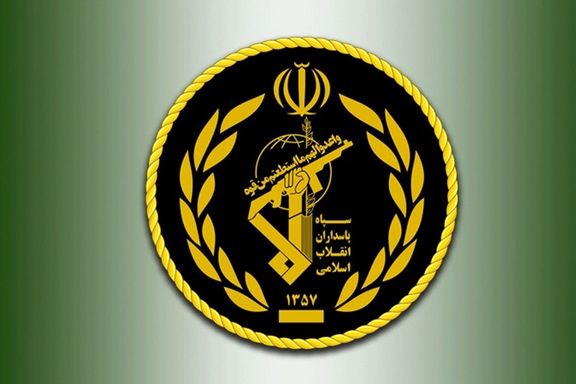
Iran's Revolutionary Guard (IRGC) has released a statement taking responsibility for the ballistic missile attack on Iraq's Kurdish regional capital of Erbil.

Iran's Revolutionary Guard (IRGC) has released a statement taking responsibility for the ballistic missile attack on Iraq's Kurdish regional capital of Erbil.
The Sunday statement coming hours after the attack said Israeli "strategic centers" were targeted “last night with precision-guided missiles” of the IRGC, while the apparent target was the US consulate in the city.
It stressed that the Iranian armed forces are a “red line” and “no one will be allowed to threaten or attack them”.
"Any repetition of attacks by Israel will be met with a harsh, decisive and destructive response," the statement added, noting the IRGC had vowed it would not “leave Israel’s crimes and evils unanswered”.
On Monday, the IRGC had vowed to avenge the death of two of its officers in an Israeli air strike near the Syrian capital Damascus.
The IRGC statement said Col. Ehsan Karbalaipur and Morteza Saeednejad “were martyred” on the outskirts of Damascus by an Israeli missile attack. “Without a doubt the Zionist regime will pay for this crime.”
Iran has entrenched itself in Syria after a decade of military involvement is support of Bashar al-Assad’s government and Israel often strikes Iranian military targets it deems a threat.
A dozen ballistic missiles struck Erbil at 1 am on Sunday, targeting the US consulate's new building and the neighboring residential area but caused only material damage and one civilian was injured, the Kurdish interior ministry said.
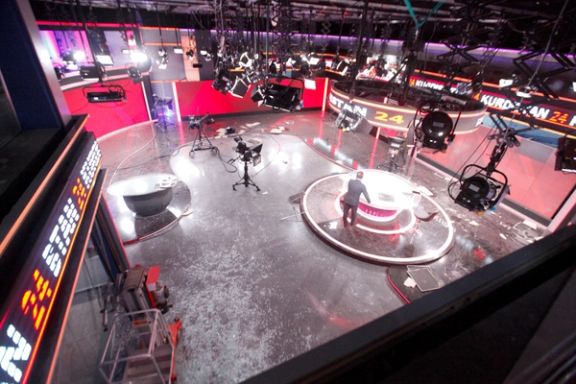
Lawmakers and former American officials have reacted to an Iranian ballistic missile attack on the US consulate in Iraq’s Erbil urging an end to Iran nuclear talks.
In a major escalation of tensions in the Middle East, a dozen ballistic missiles struck Erbil at 1 am on Sunday, targeting the US consulate's new building and the neighboring residential area but caused only material damage and one civilian was injured, the Kurdish interior ministry said on Sunday.
Iran's Revolutionary Guards released on Sunday a statement taking responsibility for missile attacks against Israeli "strategic centers" in Iraq's northern Kurdish regional capital of Erbil
Democratic representative Elaine Luria said in a tweet hours after the attack that she is continuing to monitor the situation, stating that “if reports are accurate, the Biden Administration must withdraw its negotiations with Iran”.
“We cannot re-enter a failed JCPOA to further empower Iran and threaten global security”, the Navy veteran added.
Republican Congresswoman Lisa McClain said, “This aggression shows we should absolutely end all Iran Nuclear Deal negotiations now. We must also never buy Iranian oil”.
Congressman Ritchie Torres twitted, “Iran attacks a US consulate while seeking US sanctions relief? No Bueno”.
Senior Adviser at the Foundation for Defense of Democracies Richard Goldberg urged Biden to convene an emergency meeting of the National Security Council “to assess available intelligence & consider a full range of military, cyber, economic & political responses, noting, “The Russian-brokered Iran Deal on the table in Vienna includes lifting terrorism sanctions on Iran’s central bank, oil company, tanker company, petrochemical company & many more alongside removing the IRGC from the FTO list. Tonight should be a death knell for this horrible deal”.
“No country can be allowed to launch missile attacks against US interests without facing an immediate and meaningful response. There are a range of options. Deterrence must be restored. This isn’t partisan. If the President acts, he should get bipartisan support”, he added.
Gabriel Noronha, a former official at Iran desk in the State Department said, “Democrats and Republicans in Congress agree: Biden must not continue talks with Iran while they attack our bases in Iraq”.
Another official of the former US administration Robert Greenway, who was part of the negotiating team for the Abraham Accords, said, “Is it too much to ask Iran cease threatening US citizens to continue negotiations or enjoy any benefits of a deal? Or that we consider a regime so committed to killing more Americans unworthy of our trust negating the viability of any deal?”
Andrew Lewis Peek, who was a strategic advisor to the NATO commander in Afghanistan, said in a tweet, “Tonight’s missile attack in Iraq is 100% representative of a breakdown of deterrence against Iran not just under Biden, but under years of US policy in Iraq”.
Former research fellow at the Washington Institute Nadav Pollak has reacted to a video shared by advisor to Iran's nuclear negotiating team Mohammad Marandi, who gloated, “This is just the beginning”.
Pollak said, “The fact that Iran is doing this while talks are still being held in Vienna says something about how they perceive the EU and US resolve to contain them”.
A State Department spokesperson told Axios that the incident "is being investigated by the government of Iraq and the Kurdish Regional Government."
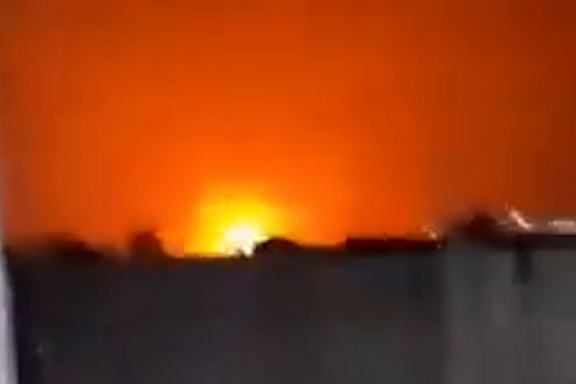
Missile attacks that struck Iraq's northern Kurdish regional capital of Erbil in the early hours of Sunday were launched from Iran, a US official told Reuters.
In a major escalation of tensions in the Middle East, a dozen ballistic missiles struck Erbil at 1 am on Sunday, targeting the US consulate's new building and the neighboring residential area but caused only material damage and one civilian was injured, the Kurdish interior ministry said on Sunday.
An Iranian state-TV correspondent based in Iraq said that the missiles were aimed at "secret Israeli bases," a claim repeated by government-controlled media in Iran.
Fars News in Iran affiliated with the Revolutionary Guard (IRGC) reported the attack Sunday morning only quoting a pro-Iran news agency in Iraq saying that ballistic missiles hit “military targets” in Erbil.
Later on Sunday, Iran's Revolutionary Guard took responsibility for launching the attack.
Earlier in the week Iran vowed revenge for the death of two IRGC officers near Damascus Syria in what appeared to have been an Israeli air or missile attack.
There was no official claim of responsibility or further details available. A US State Department spokesperson called it an "outrageous attack" but said no Americans were hurt and there was no damage to US government facilities in Erbil.
The official government news agency IRNA also quoted Iraqi sources saying the attack targeted “advanced training centers of Israeli spying agencies.”
The attack also coincides with a “pause” in nuclear talks in Vienna. After 11 months of talks between Iran and world powers to revive the Obama-era nuclear agreement called JCPOA came to a halt after Russia made demanded that it be exempt from Ukraine sanctions in its dealings with Iran.
The attack on Erbil is expected to have a further negative impact on any chances of a nuclear agreement.
An Iranian website reflecting the views of the country's national security council announced Sunday that scheduled talks with Saudi Arabia have been "suspended".
US forces stationed at Erbil's international airport complex have in the past come under fire from rocket and drone attacks that US officials blame on Iran-aligned militia groups, but no such attacks have occurred for several months.
The last time ballistic missiles were directed at US forces was in January 2020 - an Iranian retaliation for the US killing earlier that month of its military commander Qasem Soleimani at Baghdad airport.
No US personnel were killed in the 2020 attack, but many suffered head injuries.
Iraq and neighboring Syria are regularly the scene of violence between the United States and Iran. Iran-backed Shi'ite Islamist militias have attacked U.S. forces in both countries and Washington has on occasion retaliated with air strikes.
Kurdish officials did not immediately say where the missiles struck. A spokesperson for the regional authorities said there were no flight interruptions at Erbil airport.
Residents of Erbil posted videos online showing several large explosions, and some said the blasts shook their homes.
Iraq has been rocked by chronic instability since the defeat of the Sunni Islamist group Islamic State in 2017 by a loose coalition of Iraqi, U.S.-led and Iran-backed forces.
Since then, Iran-aligned militias have regularly attacked US military and diplomatic sites in Iraq, US and many Iraqi officials say. Iran denies involvement in those attacks.
With reporting by Reuters
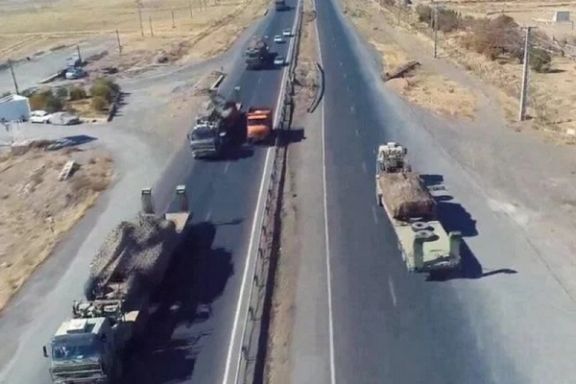
Tehran and Baku have agreed to build a highway to connect Nakhchivan to Azerbaijan ‘s Eastern Zangezur Economic Region through Iran.
Iranian Road Minister Rostam Ghasemi and Azerbaijan’s First Deputy Prime Minister Shahin Mustafayev signed the agreement during a meeting with President Ilham Aliyev in attendance in capital Baku on Friday.
The 55-kilometer highway will bypass the territory of Armenia, which is located between Nakhchivan and Azerbaijani region of Kalbajar-Lachin, now named Eastern Zangezur.
The region was in Nagorno-Karabakh that came under the control of Azerbaijan after Yerevan and Baku fought a war over the disputed region in 2020.
This highway will also connect to the International North–South Transport Corridor that is a multi-mode network of ship, rail, and road route for moving freight across India, Iran, Azerbaijan and Russia.
In January, Iran and Azerbaijan signed another dealto construct a bridge on Astarachay River running along the joint border as part of their plans to increase road transit between the two countries.
In a message to President Ebrahim Raisi on the 30th anniversary of the establishment of diplomatic relations between Azerbaijan and Iran Saturday, Aliyev said, “Over the years, numerous reciprocal trips, signed documents and agreements, as well as joint projects have played an important role in the development of our dynamic cooperation in political, economic, transport, energy, cultural and other fields”.

Sweden on March 10 deported back to Iran two alleged Iranian agents who were arrested for links to a terrorist plot, instead of putting them on trial.
According to documents seen by Iran International, the real identity of the two suspects were Fereshteh Sanai-Fari (female) and Mehdi Ramezani (male), who had entered Sweden with fake names of Salma Khormai and Javad Malekshahi, respectively.
The two, who entered Sweden in 2015 as refugees during the great refugee flood to Europe, without any documents, had claimed they were from Afghanistan and lied about their age.
Sweden’s security agencies arrested the female and male suspects in April 2021, but never revealed details of their offenses. The only crime publicly known is their false claims during their refugee hearings and alleged “conspiracy to commit a criminal terrorist act.”
According to a report by IranWire, Sweden's Deputy Chief Prosecutor Hans Ihrman said on Thursday that the two have been repatriated to Iran because the prosecutor’s office hadn’t received the needed documents from security agencies to charge them.
The United States also wanted the suspects but according to Ihrman, the request to extradite the two had not arrived in time before their deportation back to Iran.
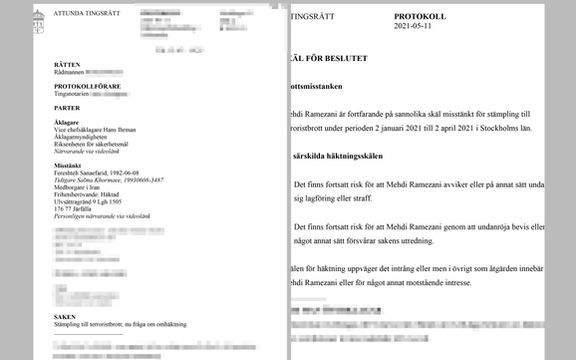
IranWire cited an unnamed source as saying that "It seems that the security police did not provide all the information and documents to the prosecutor, who could not indict them without material evidence. The only option the prosecutor had was to request the dismissal [of the case]."
The Swedish Security Service said they had travelled to Europe as a terrorism sleeper cell, saying they were believed to be agents for the Islamic Republic who sought to execute a terrorist act against Iranian dissidents, apparently American citizens, but didn’t disclose the targets’ names.
Finland-based journalist Kambiz Ghafouri told Iran International that Sweden probably deported them because it is already too busy with trials of similar cases such as Hamid Noury (Nouri) and Kia brothers for their past crimes or links with Iranian intelligence and doesn’t want more tensions in its relations with Tehran.
Sweden is entagled in another Iran-related case. Ghafouri said the Islamic Republic has tied the fate of Iranian-Swedish doctor Ahmadreza Djalali (Jalali) -- who was arrested in 2016 by Iranian intelligence on vague charges of spying and was sentenced to death on October 21, 2017 --to the extradition of Iranian diplomat Asadollah Asadi – who was arrested in 2018 for the attempted bombing of an assembly of the Mujahedin-e Khalq (MEK) opposition group near Paris.
There is also the case of Stephen Kevin Gilbert and Simon Kasper Brown, two Swedish nationals charged with drug trafficking in Iran that the Islamic Republic wants to use in a prisoner swap to get Nouri.
Nouri was arrested in November 2019 while visiting Sweden and charged with war crimes for his role in the execution of up to 5,000 political prisoners in Iran serving jail time in 1988.
Peyman Kia, now 41 years old and a former head of Swedish security police, and his brother Payam were arrested late in 2021 in Sweden and are facing espionage charges.
Sweden has a large Iranian community made of former and current refugees, among them many anti-regime activists and human rights advocates.
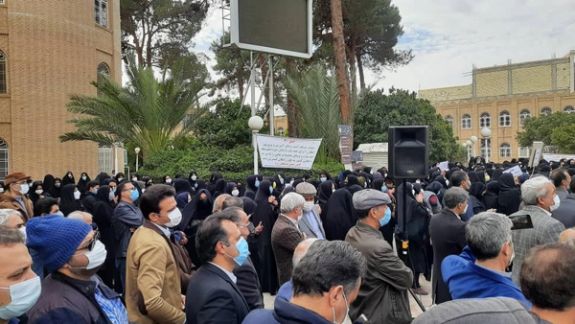
Security forces in northern Iran on Saturday used force to disperse teachers who attempted to rally in support of a colleague, according to social media posts.
Teachers in Gilan province had planned a rally Saturday in front of the department of education in Roudsar to show support for colleague Aziz Ghasemzadeh, whose trial began on Saturday.
Ghasemzadeh, spokesman for the Coordination Council of Iranian Teachers’ Trade Associations in Gilan province, was arrested at his home in Roudsar September 26 after organizing teachers' protests calling for higher wages.
He was released on bail after two weeks during which he claimed he had no access to a lawyer or his family. The Coordination Council said security forces prevented Ghasemzadeh's family from accompanying him to court on Saturday, confiscated his brother's mobile phone, and arrested a relative outside the court.
Social media has as yet no videos of these events, possibly due to internet disruption. But in an audio recording released by the Telegram social-media channel of the Coordination Council of Iranian Teachers’ Trade Associations, a female teacher claimed she and other teachers had been beaten by security forces, including by female officers, outside the education department.
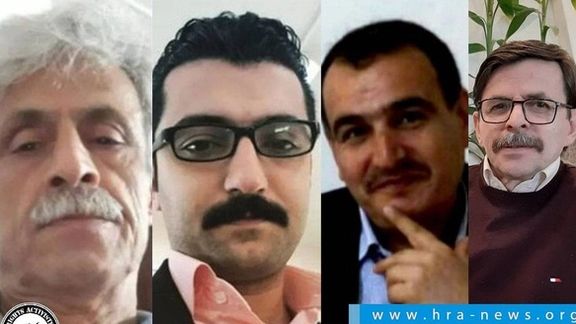
She said the police had used profanities and accused the teachers of being involved in a sedition to overthrow the regime.
Other social media users said security forces stationed in front of the education department had dispersed any groups approaching the area. They also said police reportedly blocked roads leading to Roudsar to block supporters from other areas of the province. According to social media reports, at least five teachers were arrested by security forces in Roudsar.
Teachers across Iran have staged several nationwide protests and strikes in the past six months and have vowed to continue protests until authorities meet their demands including fair wages and freedom of other colleagues who have been imprisoned for their trade union activities.
Following protests across Iran in December, the executive board of Education International, the Brussels-based federation of trade unions of teachers and education workers,in a resolution demanded respect for the "rights of teachers and education workers to organize and to freedom of association and freedom of speech including the right to peaceful assembly, without fear of intervention by the authorities" as well as “institutionalizing dialogue” with teachers' representative organizations.
With consumer price inflation at 40 percent in 2021, and food prices rising faster, after four years of United States ‘maximum pressure’ sanctions, various Iranian workers have held protest rallies or strikes to demand higher salaries.